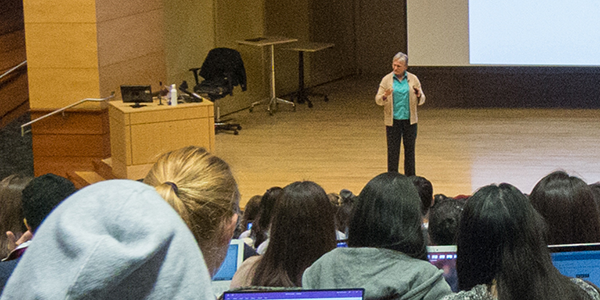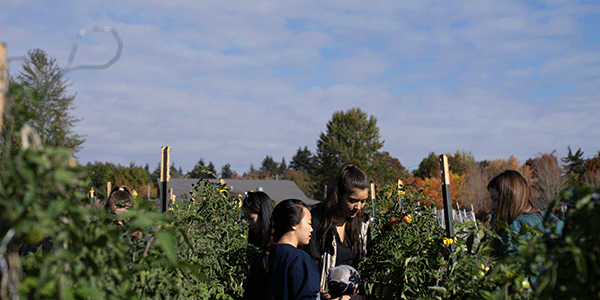
The world faces food problems on multiple fronts: Obesity is skyrocketing in some countries, yet millions of people don’t get the nutrients they need. Climate change and conflict, meanwhile, are compounding our ability to feed the world’s growing population. At the same time, about a third of food produced ends up in the trash.
Undergraduates at the University of Washington School of Public Health will grapple with these issues in a new major on Food Systems, Nutrition and Health. The major, which leads to a Bachelor of Arts, is believed to be the first of its kind within an accredited school of public health. Students will enroll starting in winter 2019.
“Students in the major will be prepared to tackle food system challenges using systems-thinking and interdisciplinary approaches,” said Elizabeth Kirk, director of undergraduate studies in the Nutritional Sciences Program and senior lecturer in epidemiology.
A food system includes all the processes and resources that go into producing and consuming food, including the pathways that excess food takes to waste or recovery. It is an interconnected web of parts and activities that includes food-supply chains, natural resource availability, farm labor, policy, social justice, health, food culture and consumer behaviors, all operating within a larger socioeconomic, geopolitical and ecological context.

Through core courses, students will address the complexity of food systems – including how and what resources are used to grow, harvest, package, distribute, sell and dispose food – and how it affects human and ecological health and well-being. In a core course on systems modeling, developed with the College of Engineering, students will learn a framework and tools to predict how the solutions they propose for specific problems could have an impact.
Students will explore areas such as microeconomics, global warming, public policy, oceanography and culinary nutrition science. Courses will be offered through the School of Public Health, College of Arts & Sciences, College of Built Environments, College of the Environment, Foster School of Business, College of Education, the Jackson School of International Studies, School of Law, School of Nursing and Evans School of Public Policy & Governance.
Students will also embark on one of four different pathways: environment and sustainability; business, economics and marketing; social and economic equity; or nutrition and health equity.
“With the addition of the new major in food systems, we can show that nutrition, health equity and the environment are central to the UW mission in population health.”
– Adam Drewnowski, Director of the Nutritional Sciences Program
“We’re helping students shape their education so they can develop an in-depth understanding of a particular area of interest,” Kirk said. “Students will meet the overall food systems, nutrition and health competencies, but they’ll also be able to dive deep into specific areas. It’s truly extraordinary.”
Because the curriculum crosses so many schools and colleges on campus, students will benefit from a wealth of faculty expertise that could help them become change makers in our food system, according to Jennifer Otten, a Nutritional Sciences faculty member and associate professor of environmental and occupational health sciences. Otten is an expert on food systems and has researched food waste prevention and recovery as well as the impact of minimum wage on health and nutrition.
Experiential learning opportunities across the Pacific Northwest could strengthen community partnerships and increase student learning and career readiness. These opportunities begin early on in the major. In the core course “Harvest to Health,” students will use the UW as “a learning lab.” They’ll visit the UW Farm and the Mercer Court plot to explore how food is produced in different conditions as well as the many pathways that food takes getting to consumers. With UW Recycling, they’ll learn how a large public university manages food compost. Later, students will engage with partners across the local and regional food system in their culminating capstone project.

For the capstone, students will work in teams – and with the guidance of a faculty member and in partnership with a community leader – to explore food system issues. Community partners might include farm and food system organizations, schools, public health agencies, conservation districts or food hubs that connect producers to consumers. Projects could range from working with public agencies to create common system metrics aimed at monitoring and generating a healthier regional food supply to altering aquatic food supply chains to better serve underserved communities.
“Something we know about developing future leaders is that accessing passion and coupling it with experiences that engage their whole selves is really a formula for success,” said Yona Sipos, a new lecturer in Nutritional Sciences and environmental and occupational health sciences. “By partnering with the community, we’ll benefit from their expertise while also helping to support them in addressing key issues around the region.”
This story was featured in the fall 2018 issue of SPH Connect.
